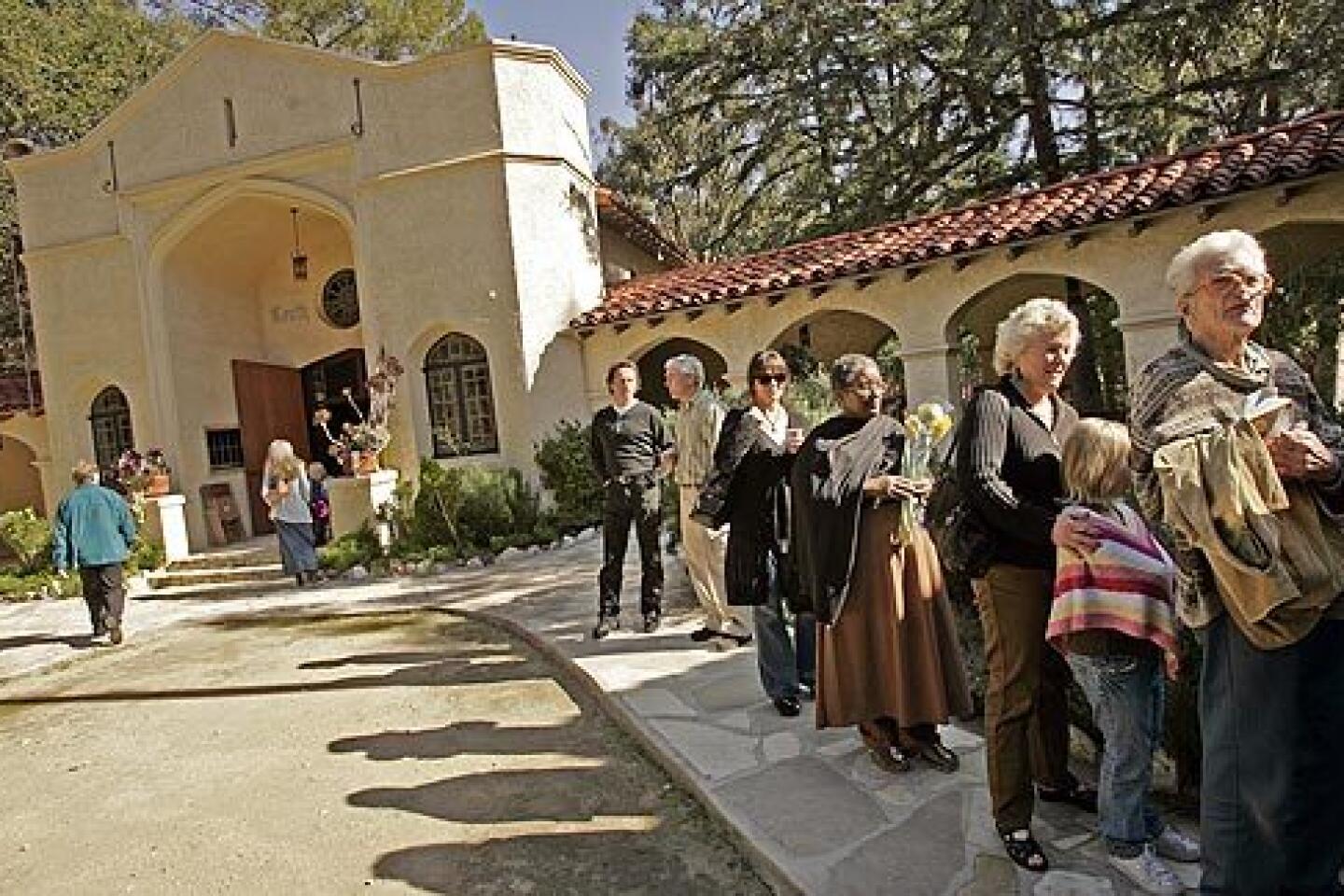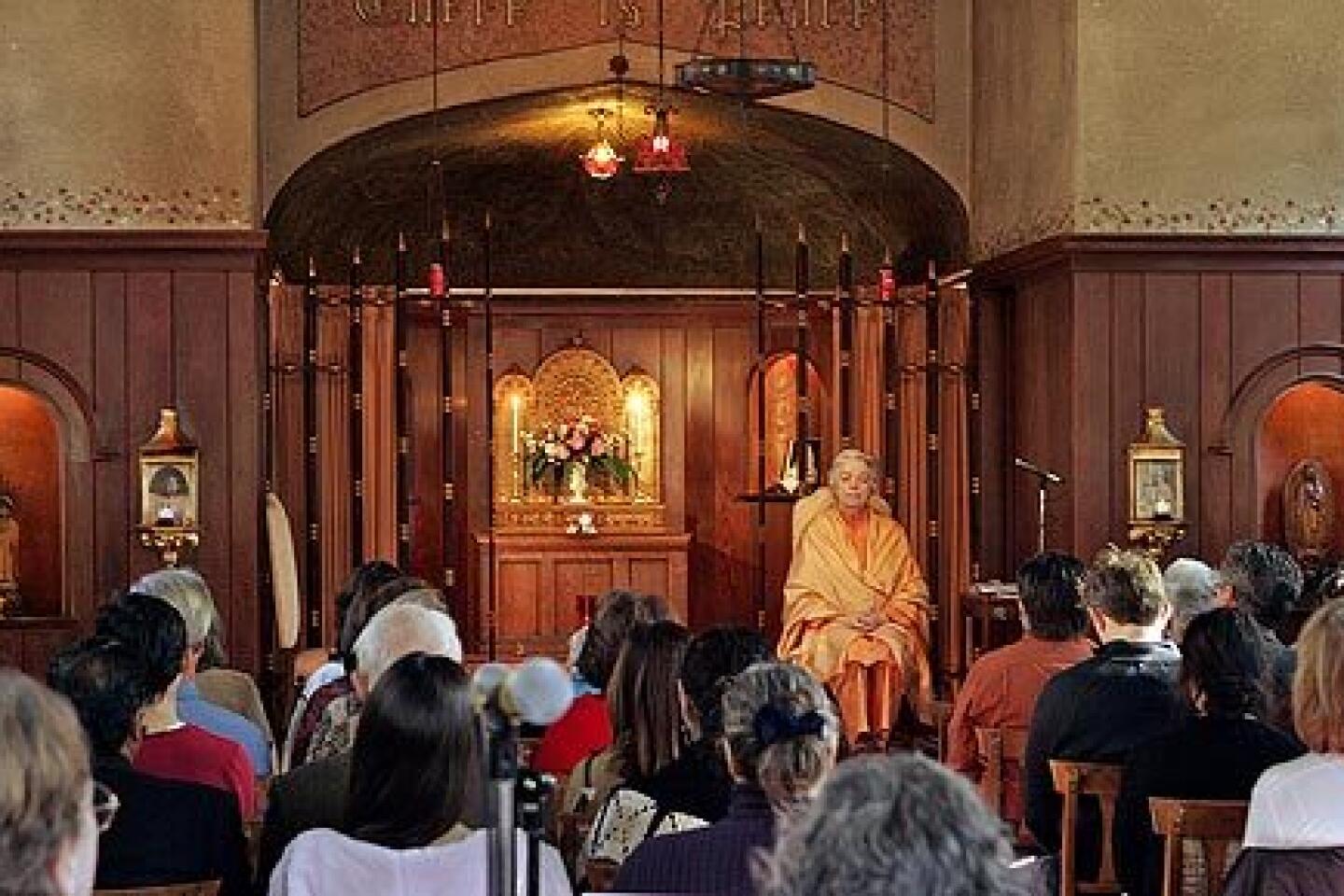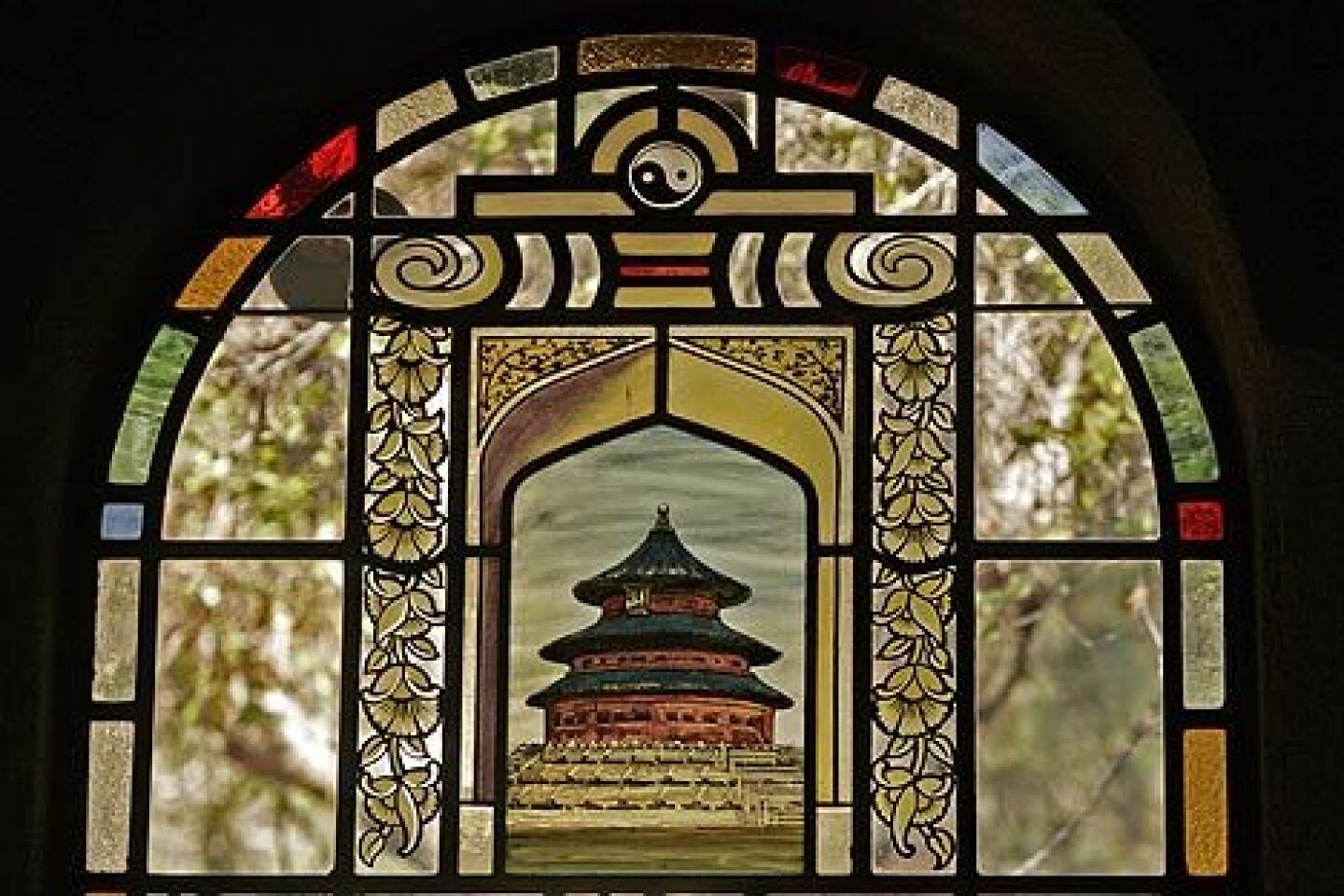Gathering in a spirit of inclusiveness
Pennsylvania Avenue slopes upward through suburban La Crescenta, runs past neatly ordered ranch-style homes and ends at the lush greenery of the snow-capped San Gabriel Mountains. There, at the foothills, sits the Temple of the Universal Spirit.
“It was strange to see something like this here,” said Scott Francis, 53, of Silver Lake. “I was just hiking around and saw it.”
Intrigued, he made his way to the temple and its surrounding gardens and learned that the compound is dedicated to Vedanta, a Hindu philosophy.
Francis, a self-described Christian who recites a personal version of the Lord’s Prayer every day, did not expect much: “I’ve been to many different types of churches, but I always get disappointed in them.”
But something about the temple -- something that eludes description -- brought him back.
So last Sunday, a few weeks after his chance discovery, he joined about 80 others who packed the pews of the small temple, also called an ashrama. The smell of fresh-cut flowers mixed with the woody scent of incense as a choir soulfully sang “We Shall Overcome.”
Refracted morning light streamed through the stained-glass windows, which depict various houses of worship, such as a Shinto temple and a Muslim mosque. A statue of the Virgin Mary flanked the altar, above which is inscribed: “Where I am there is peace.”
The temple is the spiritual seat of Ananda Ashrama, founded in 1923 by Swami Paramananda, a disciple of Swami Vivekananda, the man credited with introducing Vedanta -- and yoga -- to the United States in the late 19th century.
Vedanta, a Sanskrit word that translates roughly to “supreme wisdom,” is rooted in the Upanishads, sacred Indian texts. Though tied to Hinduism, Vedanta is nonsectarian and does not advocate converting from one religion to another. Modern Vedanta, the philosophy practiced at the Ananda center and at many places across the country and world, also seeks to help people follow their faith -- no matter the denomination -- more fully.
“The appeal of Vedanta is that one of our basic tenets is that all paths are a means to the end -- the end being a relationship with the One, or the divine,” said Sudha Puri Devi, the swamini, or spiritual leader of the ashrama.
Indeed, in her Sunday service, Sudha Ma, as she is known by congregants, stressed the idea of a “universal spiritual truth” present in every religious tradition. Her sermon on the principles of nonviolence -- in celebration of Martin Luther King Jr. Day -- included references to Jesus Christ, the Dalai Lama, Judaism, the Bhaghavad Gita and the law of karma.
There were no group prayers, but the congregants repeated Sudha Ma’s words as she read a “daily thought” on nonviolence. “Peace be unto us and all living beings,” she said to conclude the service.
For Barbara Paul, 52, a jewelry designer from La Crescenta who displays a “Freedom of religion” bumper sticker on her SUV, this all-inclusive nature was what brought her to the center in 1996. Baptized a Catholic and raised by a Jewish mother, Paul did a lot of “church shopping.”
“I didn’t like that other religions dictated how you found the divine,” Paul said. “With Vedanta, I’ve learned the divine comes to each one of us in the way we can understand, in the way we can connect. For some it’s Jesus, for some it’s Allah, for some it’s Buddha.”
Some have come to Vedanta with no faith at all.
Leonore Lisiwicz, 52, an educational consultant from La Cañada Flintridge, was brought up an atheist. Today, she calls herself Nalini, a name given to her in 1974 by her Vedanta spiritual guru at the time, and she attends spiritual services and meditation sessions at the ashrama every week.
“Vedanta gives you something to lean on that’s outside of and higher than yourself,” Lisiwicz said.
To Sudha Ma, Vedanta’s appeal to atheists and agnostics makes sense, particularly in a society she compares to a hamster wheel.
“People are so weary and they don’t realize it sometimes. We’re bombarded at every level,” she said. “Vedanta is about turning inward and dealing with it all. Do what nourishes you, and be with the people you love.”
Paul, who volunteers as caretaker of the weekend guest house, says that some visitors walk around the hilly 120-acre grounds, meditate in the Buddha garden, play music or simply sit on the screened-in porch and bask in the beauty of the place.
A family of deer is said to roam the wooded gardens. Though signs warn of mountain lion sightings, the people who stroll the curving stone pathways, lined by pine and eucalyptus, seem far from fazed.
Margaret Bergsten, 55, a respiratory therapist from Scituate, Mass., who has been practicing Vedanta for three decades and is on holiday in Southern California, said spending the weekend in the guest house was one of many things she can do to find her conception of the divine.
“You go through the gates, time stops, everything changes,” Bergsten said as she drank tea in the dining room. “You think a little more -- and that’s what I’m looking for.”
Paul agreed and added: “Some people come here and don’t feel the same way I do, but that’s OK -- this is not their path.” Sudha Ma understands the need for a personal path to spirituality. She used to be known as Susan Schrager and was once an Episcopal nun.
Some people visit the temple for years, she said, and others for shorter periods. “You stay as long as you feel spiritually nourished. Your path is your own,” she said.
After the service, in the cloistered courtyard, Sudha Ma, draped in orange fabric, greeted a long line of congregants.
An elderly woman in a wheelchair whispered in her ear while a younger woman wearing jeans and sporting a bindi on her forehead gave her a hug. A man in his 20s complained of a head cold and stress at work but praised that morning’s sermon as being what he needed to hear.
Francis, the hiker who stumbled across the temple, nodded slowly. He said he’d be back for a third time this Sunday.
daniela.perdomo
@latimes.com
More to Read
Start your day right
Sign up for Essential California for news, features and recommendations from the L.A. Times and beyond in your inbox six days a week.
You may occasionally receive promotional content from the Los Angeles Times.











